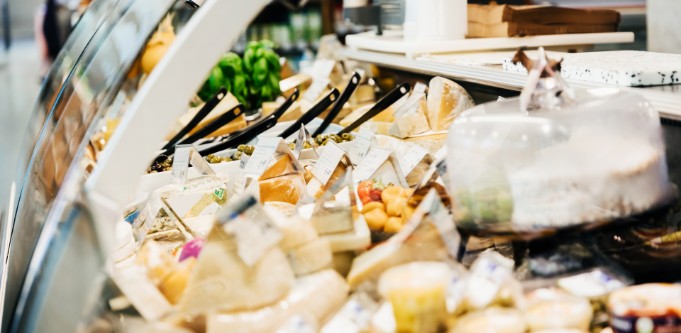
David Jones has launched its first standalone food store in Melbourne in a bid to lock down Australia’s gourmet grocery market and take share from Coles and Woolworths by offering fresher and, it argues, tastier prepared food.
The 425sqm store, located on the ground level of Capitol Grand, a high-end residential and retail development on Chapel Street in South Yarra, stocks a large range of prepared meals, including a newly launched vegan range, alongside meat, eggs, dairy, fresh produce and other groceries and pantry staples, such as pasta, olive oil, tea and biscuits.
Roughly 60% of items in the store are private label, most of which were developed exclusively for David Jones by Inspired Foods, the Australian arm of Interfood, South Africa’s leading food supplier.
According to Pieter de Wet, David Jones’ managing director of food, this partnership gives the retailer a competitive edge in Australia’s $110 billion grocery market, which increasingly is shifting towards fresh and prepared food.
“Because of the long distances and supply chain issues in Australia, when [supermarkets] go into fresh, and I’m talking particularly about convenience and fresh meals, shelf life becomes a big issue,” de Wet told Inside Retail.
“You’ll find products deemed fresh have a shelf-life of 30 days, and then there’s no flavour, quality goes out the window.”
In comparison, most of David Jones’ prepared meals have a shelf life of four to five days, he said. This is because Inspire Foods has developed different processes to prepare food without preservatives.
“The IP we created over decades of working with our suppliers is what delivers those products, and over time, that’s what we see as a big opportunity that will differentiate us,” he said.
Gourmet grocery not without risks
De Wet declined to say how many standalone food stores David Jones will open, but said the retailer aims to be the only national player in Australia’s underdeveloped gourmet grocery market.
“If you look at other markets, there are one or two retailers occupying the top end of the market,” he said, pointing to M&S and Waitrose in the UK and Whole Foods in the US.
“In Australia, it’s a little bit different. It’s almost occupied by food service. You’ve got a couple of independents, but nobody is doing it at scale and cohesively. There’s an opportunity there,” he said.
Gary Mortimer, an associate professor at Queensland University of Technology’s business school, agrees that the top end of the market is “ripe for exploitation”.
“Such a strategy has proved successful in cushioning several international supermarkets from increased price discounting,” he told Inside Retail.
But it is not without risks. Woolworths closed down its gourmet grocer business Thomas Dux in 2017, and Brisbane-based Mercado slipped into voluntary administration in May.
“The key challenge is volume and selecting the right locations,” Mortimer said.
Third tier of a $100 million food strategy
The store in South Yarra marks David Jones’ third food format since it announced its $100 million food strategy in 2017.
The retailer over the past two years has opened food halls in its department stores in Sydney, Melbourne, Adelaide and Perth, where customers can dine on sushi and oysters and purchase gourmet food products between shopping for clothes and homewares, and in August, it announced a partnership with BP to offer fresh food and prepared meals in its service stations.
The new store occupies a middle territory between these two formats. In addition to its grocery offer, it also features an in-house espresso bar and a pop-up shop from The Plant Society, where customers can buy freshly cut flowers, potted plants and accessories.
Going forward, de Wet said the retail will expand its food offer primarily through its partnership with BP and standalone stores like the one in South Yarra, rather than food halls.
“BP have got a massive network, the opportunity there is very big. If you look at M&S, they’ve got 400 BP stores in their network, there’s a real opportunity there for us,” he said.
“How big this could become over time … time will tell.”
This article was first published by Inside Retail.
NOW READ: Why David Jones is selling roast chickens (and 349 other products) at BP servos
NOW READ: Is retail in recession, or are department stores dead?


COMMENTS
SmartCompany is committed to hosting lively discussions. Help us keep the conversation useful, interesting and welcoming. We aim to publish comments quickly in the interest of promoting robust conversation, but we’re a small team and we deploy filters to protect against legal risk. Occasionally your comment may be held up while it is being reviewed, but we’re working as fast as we can to keep the conversation rolling.
The SmartCompany comment section is members-only content. Please subscribe to leave a comment.
The SmartCompany comment section is members-only content. Please login to leave a comment.